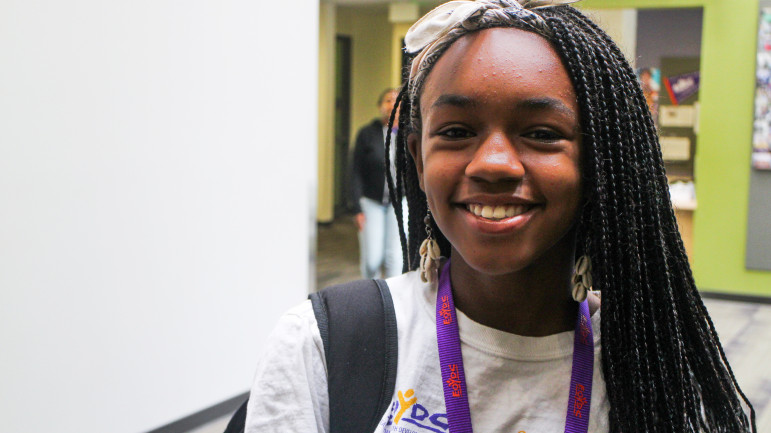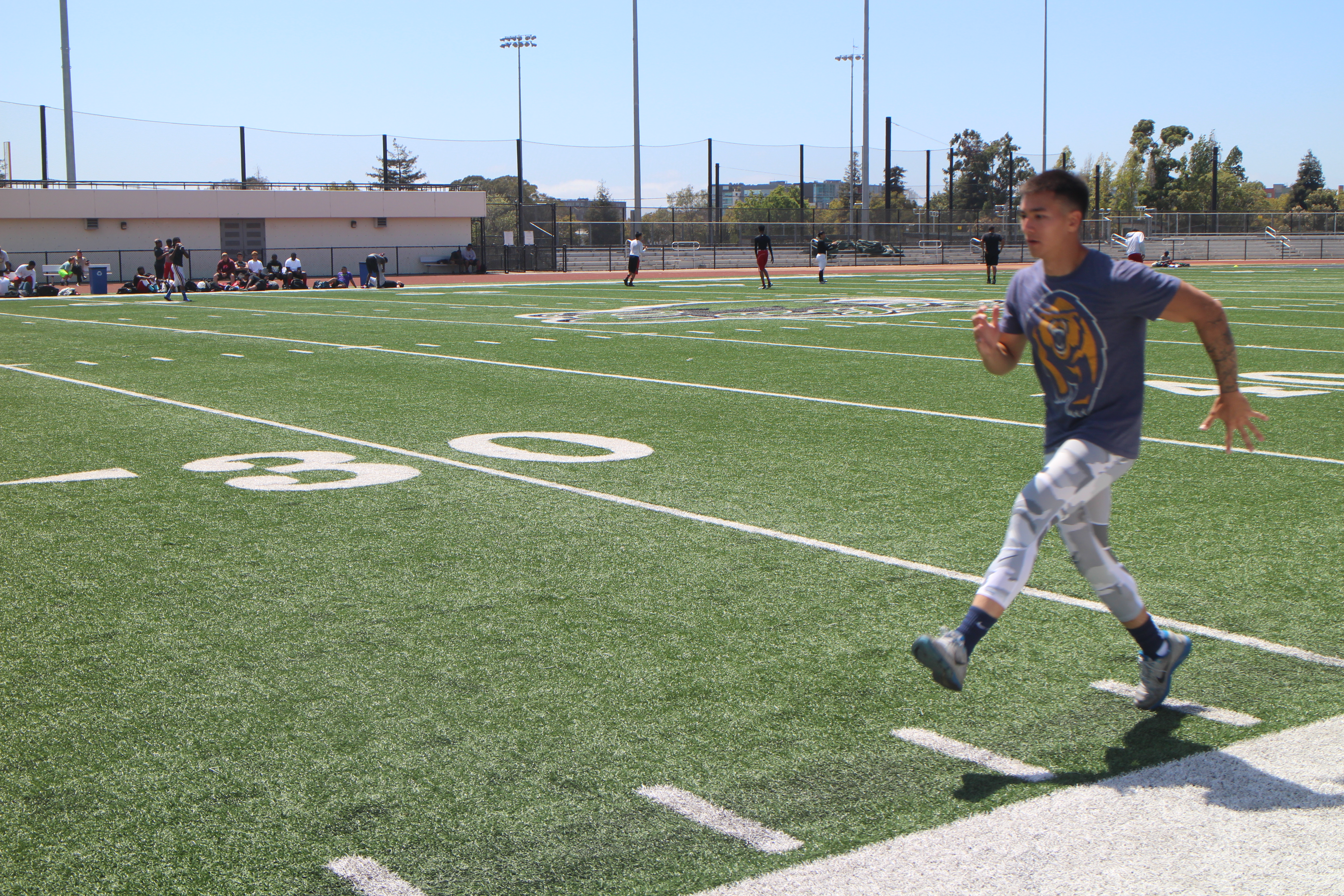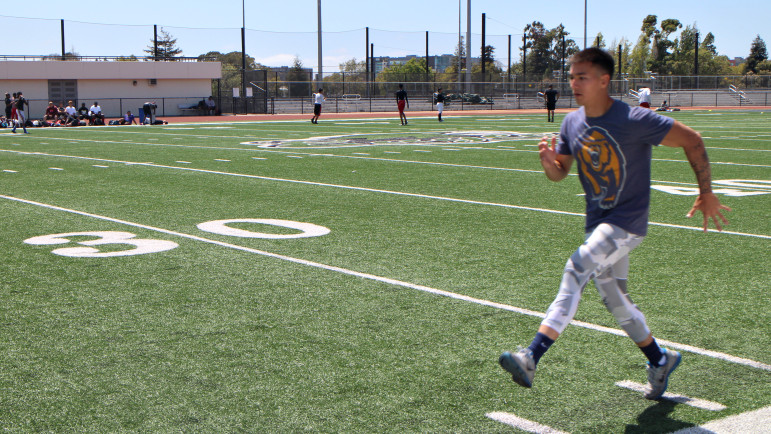OAKLAND, Calif. — Growing up in East Oakland, Calif., 19-year-old Blake Brown worked hard to steer clear of the constant crime and violence in his community.
“Even though growing up in Oakland was rough, I had opportunities to better myself,” Brown said. “I’ve always had the mentality that if you want to go somewhere in life, you got to go the extra mile.”
Starting from a young age, Brown took that mentality literally. He joined the nonprofit C.A. Track Club when he was in elementary school, running every day and fostering a passion for the sport.
“The normal street environment is the gangs, the drugs and everything. A lot of my friends became a part of it: selling drugs, going to jail and a lot of them were murdered,” Brown said. “I’m seeing my friends go and I know I don’t want to go, so I knew I needed to do something to make sure I can get out of Oakland and live my life.”

Sarah Zahedi
Coach Julian Purvis (left) and her sister Ashton Purvis, both former EOYDC track club members, mentor current track club members during practice at Laney College.
Among Oakland’s 35 police patrol beats, violent crime remains a serious problem in the East and West Oakland neighborhoods. In 2008 (the most recent study found that compared Oakland neighborhoods), homicides were disproportionately concentrated, with 72 percent occurring in one part of West Oakland and two sections of East Oakland, even though these areas represent only 44 percent of Oakland’s residents. The community also struggles with widespread poverty, low educational attainment, high unemployment and poor health outcomes.
Despite the challenges in his community, Brown maintained a positive attitude.
“I kept getting better and better,” Brown said. “Once I was moving into high school, I was looking for a coach that was able to target some of the skills that I wanted to improve on.”
[Related: An Underdog Sport in NY, Wrestling Helps Students Score Better Grades]
That’s when he contacted the East Oakland Youth Development Center Track Club, hearing of former track club coach Curtis Taylor’s status as one of the top sprint coaches in the nation. Brown joined the track club during his last year of high school.
“Being in the program, I was around world-class athletes who were going to college for track,” he said. “You’re getting the best competition you can get right then, so you’re working harder and you’re becoming a lot stronger because you’re pushing yourself, and [your teammates] are pushing you.”
Since its inception in 1993, the club has participated in statewide and national track events and competitions with athletes ranking nationally every year. Athletes from 12 to 24 can be in the program free, but those participants who are in school must maintain a 2.5 grade point average to stay on the team.
The club is funded by the community-based nonprofit agency EOYDC, which works to give disenfranchised young people 6 to 24 the same training and opportunities as students from wealthier backgrounds. EOYDC serves 2,000 young people annually, the majority of them African-American (70 percent) and Latino (20 percent).
Besides the track program, EOYDC offers arts programs and educational training, including computer classes and college counseling as well as job-placement assistance. The track program has had particular success, with 98 percent of alumni moving on to college and more than 120 participants receiving full scholarships to college. Club members practice five days a week for two hours a day from mid-September to mid-August.
The 2 percent who do not attend college go on to pre-professional schools and to start careers, according to EOYDC President Regina Jackson.
Jackson said the center’s mission to “build character to build community” is applied in the track program.
“We don’t baby youth. We try to teach youth to be accountable for their behavior,” Jackson said. “If someone is not showing up in a certain way, we are direct about that and we build from that point. It’s always for their benefit.”

Sarah Zahedi
Current track club member and Piedmont High School student Toni Daggao hopes to get a full-ride track scholarship when she applies for college.
Jackson noted an important part of EOYDC’s approach is that many of the programs are youth-led, where individuals who have gone through particular program end up sharing their expertise. This is why she said she is especially happy the new track club head coach is 24-year-old alumna Julian Purvis. She began coaching in October 2014 after Curtis Taylor took a coaching position at the University of Oregon.
Purvis, who got a full-ride track scholarship to the University of Michigan after seven years on the EOYDC team, said the program changed her life. Her single mother took her and her younger sister Ashton to practice with the team every day, even when she worked three jobs.
“I didn’t grow up with a father, so when Coach Curtis came into my life, I was like, ‘I don’t have a father, but I have a father. I still call on him for everything,’” Purvis said. “I wasn’t even thinking of college at one point in my life just because I didn’t know. Curtis and Ms. Regina [Jackson] and my mom being there opened up so many doors for me.”
Julian and Ashton, 23, have traveled the world for track competitions, placing among the top fastest young women. Since graduating from Texas A&M University last May, where she had a full scholarship, Ashton plans to move to Oregon to train with Taylor to become a professional track athlete.
“Without the program, I would not have gone to this point. I was good, but I wasn’t great,” Ashton Purvis said. “I’ve travelled the world, I’ve ran on six world teams, I’ve set records. I couldn’t have done these things without having EOYDC.”
Although Purvis chose not to pursue becoming a professional athlete, she said she is glad she can keep the track program going for other kids hoping to accomplish what she did. She implements many of the same practices Taylor taught her, making sure to guide track club participants both on and off the track.
“You want the kids to have the opportunity to have choices to go to school and be great at what they’re doing. Whether they are a long jumper, hurdler or sprinter, you want them to be the best,” Purvis said. “I try to talk to my kids about life in general, life as an athlete and after you become an athlete. People say, ‘Do you miss track?’ and I say, ‘No,’ because I live it through my kids.”
One of Purvis’ track club members, 15-year-old Toni Daggao, who hopes to get a full-ride track scholarship to pay for college, said the coach’s guidance has had a great impact.
“Julian has helped me come a long way,” Daggao said. “She has a passion for track and cares about the person that you are. She’ll modify your workout just for you and is even willing to give people rides home when they need it and makes sure you’re where you need to be.
From the point that he joined EOYDC track club, Brown said he felt part of the community.
“You can never go wrong here. You’re around a bunch of loving individuals who want to see you make it, and they’ll reach out to you so you will make it,” Brown said. “I’ve definitely made a lot of friends that I keep in contact with.”
Now a rising sophomore at Merritt College in Oakland with a speciality in triple jump on the school’s track team, Brown said the progress he made on the EOYDC track team prepared him for his future.
“The program opened my mind, and I was able to see all the opportunities that would be given to me if I worked hard enough,” Brown said. “Without track, I don’t think I would have pushed so hard in school. I know it’s something I have to keep working on. In order to get further, I have to make sure my grades are up and have a lot more options for when I transfer.”
Ranked as one of the top 10 triple jumpers in junior college in the state of California, Brown is thinking of transferring to the University of Oregon to study kinesiology and work with Taylor on the track team.
“I was able to push myself really hard and persevere,” Brown said. “Track is amazing because once you actually learn the basis of it, you start to see that it’s really fun. I know if I put my mind to it, I can really do something with this.”
More stories similar to this one:
Football Practice of ‘Two-a-Days’ Phasing Out
How Much Is Too Much: The Price of Youth Sports
How to Coach a Young Soccer Prodigy
The Need for Speed Endangers Young Pitchers
They Climb, Bike, Run, Lift, Box Their Way Out of Addiction



























